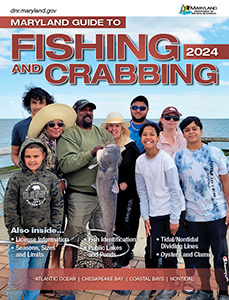Atlantic Seasons, Sizes, & Limits
Species |
Minimum Size Limits |
Open Season |
Creel Limit |
Remarks |
American Eel |
9 inches |
January 1–August 31, except open year round for spears and baited traps or pots |
Daily—25 |
|
Black Drum |
16 inches |
Open Year Round |
Daily—1 Boat limit—6 |
|
Black Sea Bass |
Please refer to the current public notices for this species, (dnr.maryland.gov/fisheries/Pages/pub_notices.aspx) |
|||
Bluefish |
8 inches |
Open Year Round |
Shore or Private Boat: Daily—3 |
|
Cobia |
40 inches |
June 15–September 15 |
1 cobia per person per day; or up to 2 cobia per vessel per day if there are 2 or more individuals on the vessel |
May catch-and-release September 16-June 14 |
Croaker (Hardhead) |
9 inches |
Open Year Round |
Daily—25 |
|
Dolphinfish (Mahi-Mahi)* |
None |
Open Year Round |
Daily—10 Boat limit—54 |
Only applies to federal waters. |
Grouper Species |
None |
Open Year Round |
Daily—1 |
Grouper species—www.dsd.state.md.us/comar/getfile.aspx?file=08.02.05.29.htm |
Lobster |
33⁄8–5¼ inches |
April 1 - January 31 |
100/person/24 hour period or 500 for a 5-day or longer trip when using gear other than lobster traps |
Must be landed whole. Spearing is prohibited. No egg-bearing females. |
Red Drum (Channel Bass or Puppy Drum) |
18–27 inches |
Open Year Round |
Daily—1 |
|
Scup (Porgy) |
Please refer to the current public notices for this species, (dnr.maryland.gov/fisheries/Pages/pub_notices.aspx) |
|||
Sharks |
||||
Sheepshead |
None |
Open Year Round |
Daily—4 |
|
Shrimp (brown, white) |
None |
Open Year Round |
None |
Must use authorized gear. |
Snapper Species (includes many species, please see list) |
None |
Open Year Round |
Daily—20 |
Snapper species—https://dsd.maryland.gov/regulations/Pages/08.02.05.29.aspx |
Spanish Mackerel* |
14 inches |
Open Year Round |
Daily—15 |
|
Spot |
None |
Open Year Round |
Daily—50 |
|
Spotted Seatrout |
14 inches |
Open Year Round |
Daily—4 |
|
Striped Bass |
See Atlantic Striped Bass Section |
Cannot be used as bait. |
||
Summer Flounder (Fluke) |
Please refer to the current public notices for this species, (dnr.maryland.gov/fisheries/Pages/pub_notices.aspx) |
To maximize summer flounder survivability, use a 3/0 or larger hook and be prepared to release undersized fish (pliers, wet rag, and a ruler). |
||
Tautog |
16 inches |
July 1 - May 15 |
January 1–May 15: Daily—4 July 1–October 31: Daily—2 November 1–December 31: Daily—4 |
May catch-and-release May 16-June 30 |
Tilefish (Blueline, Golden, Sand) |
Must follow federal limits and season, permit and reporting requirements– https://www.ecfr.gov/current/title-50/chapter-VI/part-648/subpart-N/section-648.296 |
|||
Wahoo* |
None |
Open Year Round |
Daily—2 |
Only applies to federal waters. |
Weakfish |
13 inches |
Open Year Round |
Daily—1 |
|
Alewife Herring, American Shad, Atlantic Sturgeon, Blueback Herring, Hickory Shad and Shortnose Sturgeon |
CLOSED |
|||
* Atlantic Coastal Migratory Pelagic and Charter/Headboat Permits for Spanish and king mackerel as well as the Atlantic Charter/Headboat Dolphin/Wahoo For Hire Fishing Permit are available through the National Marine Fisheries Service, Southeast Regional Office, Permits Office. |
||||

